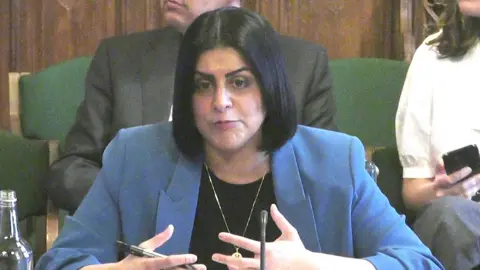'Unacceptable' to question Supreme Court gender ruling, says minister
 UK Parliament
UK ParliamentThe justice secretary has said it is "absolutely unacceptable" to question the validity of the Supreme Court after it ruled that the term "woman" is defined by biological sex.
Speaking to Parliament's Human Rights Joint Committee, Shabana Mahmood said judges at the UK's highest court "provided the legal clarity in their legal decision which is exactly their job".
The decision was seen as a victory by many women's rights groups but some trans campaigners have argued it did not take into account their view of the complexities of biology and a transgender former judge says she plans to bring an appeal to the European Court of Human Rights .
Mahmood said: "It's disappointing... that some individuals have sought to question the validity of the Supreme Court or cast aspersions..."
In its ruling, the Supreme Court said the terms "woman" and "sex" in the 2010 Equality Act "refer to a biological woman and biological sex".
This means, for instance, that transgender women, who are biologically male but identify as women, can be excluded from women-only spaces.
The judges said trans people are still protected from discrimination under equalities legislation, and that this interpretation of the law does not cause disadvantage to the "potentially vulnerable group".
The Equalities and Human Rights Commission also published interim guidance after the ruling which said trans women "should not be permitted to use the women's facilities" in workplaces or public-facing services. The same applies to trans men, who are biologically female.
But it said that trans people "should not be put in a position where there are no facilities for them to use".
Mahmood was speaking to MPs and peers a day after Dr Victoria McCloud, the only UK judge to publicly say she is transgender, said she is planning to bring an appeal case before the European Court of Human Rights.
Dr McCloud, who stepped down from a High Court role last year, said the Supreme Court judgement and equality watchdog's new guidance violated her human rights and she felt "contained and segregated".
She said the ruling had failed to consider human rights arguments that would have been put by trans people and the judgement had left her with the legal "nonsense" of being "two sexes at once".
Some trans campaigners have expressed disappointment at the ruling. They argued, for example, it is impossible for services - from police officers performing a strip search through to restaurants - to truly specify someone's biology, pointing to intersex cases as an example of where biological sex is not binary.
The Supreme Court ruling was the culmination of a long-running legal battle brought by campaign group For Women Scotland, which had argued that sex-based protections should only apply to people that are born female. The group had argued that women felt unsafe with trans women using female facilities.
Mahmood told the committee the Supreme Court had "handled things very sensitively".
She said the judges have "done their job and I think they've sought to do it in a way that recognises that we're talking about a balance of rights but sought to give confidence to a minority community that they still have protections from discrimination".
In her evidence, to the Human Rights Joint Committee, the justice secretary also addressed the government's policy on transgender prisoners.
Mahmood said it "strikes the right balance" but "we will obviously now go back and with the clarity from the Supreme Court just make sure that that policy still stands to scrutiny or whether we need to make any changes".
The justice secretary said the vast majority of trans women inmates are within the male estate, and she had not moved any trans prisoners into women's jails since taking office last July.
Prison service data for 2023-24 shows there were 295 transgender prisoners in England and Wales, with 51 in female prisons and 244 in male prisons.
But she said: "No trans women convicted of a rape or serious violence offence who retains birth genitalia would ever be considered for being placed in the women's estate."
